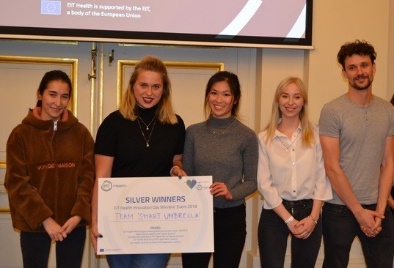Placing a smart device in a blood vessel to act as a filter that would warn of the risk of stroke is the healthtech idea devised by the Smart Umbrella team formed by students from RSU. In December 2019 Smart Umbrella was chosen as one of three winners at a prestigious competition organised as part of Innovation Days in Paris.
Ideas pitched by 33 teams, including such leading European science and study centres as the Karolinska Institute, Oxford University and Sorbonne University, were among Smart Umbrella’s competitors.
According to the World Health Organization every fifth death in Latvia is caused by stroke and as the Stroke Alliance for Europe points out in their research project The Burden of Stroke in Europe (2017) treatment of this illness requires 21 million euros from the Latvian healthcare budget annually. However, if diagnosed early and met with proper patient engagement, strokes are preventable.
The device proposed by Smart Umbrella is focused on the most common type of stroke – ischemic stroke – which takes place when blood supply to the arteries in the brain is obstructed.
“Ischemic stroke is caused by blood clots blocking arteries in the brain and results in brain damage due to lack of oxygen. The development of a filter that is placed in a blood vessel could aid in the reduction of strokes by stopping the blood clot from reaching the brain, like a fishing net. The parameters of the filters are recorded so that the information can be traced by doctors during regular check-ups and the patient themselves,” said Viktoria Luise Katharina Schaeff, co-founder of Smart Umbrella and a 6th-year medical student at RSU.
Together with 5th-year student, Kieu Anh Thi Nguyen, they have developed and pitched this idea in various Riga-based student hackathons. “The hackathons provided us with a chance to implement our medical knowledge to an interdisciplinary STEM field. There, we challenged therapeutical approaches, identified healthcare needs, and thought of different ways of improvement. At every hackathon and with the support of the mentors we have developed our idea further and have come a step closer to realising it,” says Nguyen.
The team is currently in the idea validation phase.
In Paris at the European Institute of Innovation and Technology (EIT) Health Innovation Day competition they pitched their idea as a team of five students that also included Johannes Marius Noel Voskamp, Annalena Bartnick and Sevara Kamilova.
They walked away with an that award includes mentoring and coaching support amounting to 1,500 euros and paid participation in any events organised by EIT Health in 2020 and support in preparing applications to other EIT Health programmes.
EIT Health is a European public-private partnership in the area of healthcare. It was established by more than 140 partners representing the leading European companies, universities, research and development centres, hospitals and other organisations. In 2018, RSU joined the Regional Innovation Scheme (RIS) in the area of health managed by EIT Health. Currently the university serves as the EIT Health RIS Hub in Latvia.
Nor is the RSU story the only connection between EIT and Latvia. Also in December Rīga hosted the grand final of awards in the health, food and raw materials sectors as a side event of Digital Freedom Festival 2019.




























